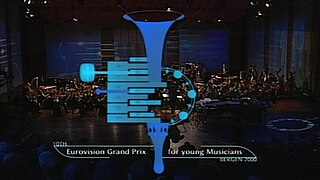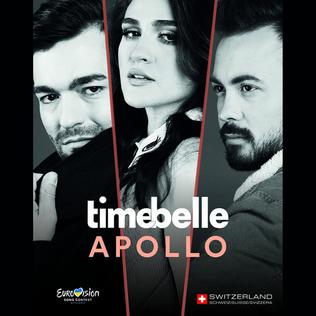
The Eurovision Song Contest 1989 was the 34th edition of the Eurovision Song Contest, held on 6 May 1989 in the Palais de Beaulieu in Lausanne, Switzerland. Organised by the European Broadcasting Union (EBU) and host broadcaster Télévision suisse romande (TSR) on behalf of the Swiss Broadcasting Corporation, and presented by Jacques Deschenaux and Lolita Morena, the contest was held in Switzerland following the country's victory at the 1988 contest with the song "Ne partez pas sans moi" by Céline Dion.

Switzerland has participated in the Eurovision Song Contest 64 times since its debut at the first contest in 1956, missing only four contests because of being relegated due to poor results the previous year: 1995, 1999, 2001, and 2003. Switzerland hosted the inaugural contest in 1956 in Lugano, where it also won. The country claimed its second victory in 1988, 32 years after the first, and its third in 2024, 36 years after the second win. The Swiss participant broadcaster in the contest is the Swiss Broadcasting Corporation.

Monaco has participated in the Eurovision Song Contest 24 times since its debut in 1959. The country's only win in the contest came in 1971, with "Un banc, un arbre, une rue" performed by Séverine. As a result, Monaco was expected to host the contest in 1972, but it ultimately declined. The Monégasque participant broadcaster in the contest was Télé Monte-Carlo (TMC). Monaco is the only microstate to have won the contest to date.

Switzerland participated once in the Junior Eurovision Song Contest in 2004. Radiotelevisione svizzera (RSI), a member organization of the multilingual Swiss Broadcasting Corporation and the European Broadcasting Union (EBU), were responsible for the selection process of their participation. The only representative to participate for the nation was Demis Mirarchi with the song "Birichino", which finished in sixteenth place out of eighteen participating entries, achieving a score of four points. Switzerland did not compete in subsequent editions due to financial difficulties.

The Eurovision Young Musicians 1992 was the sixth edition of the Eurovision Young Musicians, held at Cirque Royal in Brussels, Belgium on 9 June 1992. Organised by the European Broadcasting Union (EBU) and host broadcaster Radio Télévision Belge Francophone (RTBF), musicians from eight countries participated in the televised final. Eighteen countries took part in the competition. All participants performed a classical piece of their choice accompanied by the Belgian National Orchestra, conducted by Ronald Zollman. Hungary and Poland made their début, while Greece and Italy decided not to participate.

The Eurovision Young Musicians 2000 was the tenth edition of the Eurovision Young Musicians, held at Grieg Hall in Bergen, Norway on 15 June 2000. Organised by the European Broadcasting Union (EBU) and host broadcaster Norsk rikskringkasting (NRK), musicians from eight countries participated in the televised final. As said by the host Arild Erikstad, a total of twenty-four countries took part in the competition. All participants performed a classical piece of their choice accompanied by the Bergen Philharmonic Orchestra, conducted by Simone Young. Seven countries returned to the contest, whilst Turkey made their debut.

The Eurovision Young Musicians 1998 was the ninth edition of the Eurovision Young Musicians, held at Konzerthaus in Vienna on 4 June 1998. Organised by the European Broadcasting Union (EBU) and host broadcaster Österreichischer Rundfunk (ORF), musicians from eight countries participated in the televised final. Austria and broadcaster ORF previously hosted the contest at Musikverein in 1990. A total of eighteen countries took part in the competition therefore a semi-final was held two days earlier. All participants performed a classical piece of their choice accompanied by the Vienna Radio Symphony Orchestra, conducted by Dennis Russell Davies.

The Eurovision Young Musicians 2004 was the twelfth edition of the Eurovision Young Musicians, held at the Culture and Congress Centre in Lucerne, Switzerland on 27 May 2004. Organised by the European Broadcasting Union (EBU) and host broadcaster Swiss Broadcasting Corporation, musicians from seven countries participated in the televised final. Switzerland and broadcaster SRG SSR previously hosted the contest in 1984. A total of seventeen countries took part in the competition therefore a semi-final was held in the same venue on 22 and 23 May 2004. All participants performed a classical piece of their choice accompanied by the Lucerne Symphony Orchestra, conducted by Christian Arming.
Switzerland was present at the Eurovision Song Contest 1986, held in Bergen, Norway.
Switzerland participated in the Eurovision Song Contest 2014 with the song "Hunter of Stars" written and performed by Sebalter, which is the artistic name of singer Sebastiano Paù-Lessi. The Swiss entry for the 2014 contest in Copenhagen, Denmark was selected through the national final Die grosse Entscheidungs Show 2014, organised by the Swiss German speaking broadcaster Schweizer Radio und Fernsehen (SRF) in collaboration with the other broadcasters part of the Swiss Broadcasting Corporation. Artists that were interested in entering the Swiss national final had the opportunity to apply to one of three open selections with defined submission periods organised by SRF together with the Swiss-Romansh broadcaster Radiotelevisiun Svizra Rumantscha (RTR), the Swiss-French broadcaster Radio Télévision Suisse (RTS) and/or the Swiss-Italian broadcaster Radiotelevisione svizzera (RSI). A total of 18 entries were selected to advance to an "Expert Check" round; nine entries were selected from the SRF/RTR selection, six entries were selected from the RTS selection and three entries were selected from the RSI selection. The "Expert Check" was held on 30 November 2013 and involved three/four experts evaluating the live performances of the 18 entries and selecting six entries to advance to the televised national final—three artists and songs from the SRF/RTR candidates, two from the RTS candidates and one from the RSI candidates. The six finalists performed during the national final on 1 February 2014 where a combination of jury voting and public voting ultimately selected "Hunter of Stars" performed by Sebalter as the winner.
Switzerland participated in the Eurovision Song Contest 2015 with the song "Time to Shine" written and performed by Mélanie René. The Swiss entry for the 2015 contest in Vienna, Austria was selected through the national final ESC 2015 – die Entscheidungsshow, organised by the Swiss German speaking broadcaster Schweizer Radio und Fernsehen (SRF) in collaboration with the other broadcasters part of the Swiss Broadcasting Corporation. Artists that were interested in entering the Swiss national final had the opportunity to apply to one of three open selections with defined submission periods organised by SRF together with the Swiss-Romansh broadcaster Radiotelevisiun Svizra Rumantscha (RTR), the Swiss-French broadcaster Radio Télévision Suisse (RTS) and/or the Swiss-Italian broadcaster Radiotelevisione svizzera (RSI). A total of 18 entries were selected to advance to an "Expert Check" round; nine entries were selected from the SRF/RTR selection, six entries were selected from the RTS selection and three entries were selected from the RSI selection. The "Expert Check" was held on 7 December 2014 at SRF Studio 5 in Zürich and involved five experts evaluating the live performances of the 18 entries and selecting six entries to advance to the televised national final—three artists and songs from the SRF/RTR candidates, two from the RTS candidates and one from the RSI candidates. The six finalists performed during the national final on 31 January 2015 where a combination of jury voting and public voting ultimately selected "Time to Shine" performed by Mélanie René as the winner.

Sweden has participated in the biennial classical music competition Eurovision Young Musicians 15 times since its debut in 1986, winning the contest for the first time in 2006. Sweden are yet to host the contest.

France has participated in the biennial classical music competition Eurovision Young Musicians eleven times since its debut in 1982. France won the contest in 1986, and hosted the 2022 edition in Montpellier.
Switzerland participated in the Eurovision Song Contest 2016 with the song "The Last of Our Kind" written by Christina Maria Rieder, Mike James, Jeff Dawson and Warne Livesey. The song was performed by Rykka, which is the artistic name of singer Christina Maria Rieder. The Swiss entry for the 2016 contest in Stockholm, Sweden was selected through the national final ESC 2016 – die Entscheidungsshow, organised by the Swiss German speaking broadcaster Schweizer Radio und Fernsehen (SRF) in collaboration with the other broadcasters part of the Swiss Broadcasting Corporation. Artists that were interested in entering the Swiss national final had the opportunity to apply to one of three open selections with defined submission periods organised by SRF together with the Swiss-Romansh broadcaster Radiotelevisiun Svizra Rumantscha (RTR), the Swiss-French broadcaster Radio Télévision Suisse (RTS) and/or the Swiss-Italian broadcaster Radiotelevisione svizzera (RSI). A total of 19 entries were selected to advance to an "Expert Check" round; ten entries were selected from the SRF/RTR selection, six entries were selected from the RTS selection and three entries were selected from the RSI selection. The "Expert Check" was held on 6 December 2015 and involved four experts evaluating the live performances of the 19 entries and selecting six entries to advance to the televised national final—three artists and songs from the SRF/RTR candidates, two from the RTS candidates and one from the RSI candidates. The six finalists performed during the national final on 13 February 2016 where a combination of jury voting and public voting ultimately selected "The Last of Our Kind" performed by Rykka as the winner.
Switzerland participated in the Eurovision Song Contest 2017 with the song "Apollo" written by Elias Näslin, Nicolas Günthardt and Alessandra Günthardt. The song was performed by the band Timebelle. The Swiss entry for the 2017 contest in Kyiv, Ukraine was selected through the national final ESC 2017 – die Entscheidungsshow, organised by the Swiss broadcaster Swiss Broadcasting Corporation. Artists that were interested in entering the Swiss national final had the opportunity to apply during a submission period organised by SRG SSR. A total of 21 entries were selected to advance to an "Live Check" round held on 4 December 2016 and involved nineteen experts evaluating the live performances of the 21 entries and selecting six entries to advance to the televised national final. The six finalists performed during the national final on 5 February 2017 where public voting ultimately selected "Apollo" performed by Timebelle as the winner.

"Apollo" is an English-language song performed by Swiss band Timebelle. The song represented Switzerland in the Eurovision Song Contest 2017. It was written by Elias Näslin, Nicolas Günthardt, and Alessandra Günthardt. The song was released as a digital download on 10 March 2017.
Switzerland participated at the Eurovision Song Contest 2019 with the song "She Got Me" written by Laurell Barker, Frazer Mac, Luca Hänni, Jon Hällgren and Lukas Hällgren. The song was performed by Luca Hänni, who was internally selected by the Swiss broadcaster Swiss Broadcasting Corporation to represent the nation at the 2019 contest in Tel Aviv, Israel. "She Got Me" was presented to the public as the Swiss entry on 7 March 2019.

"Boys Do Cry" is a song by Swiss singer Marius Bear which was released as a single on 8 March 2022. The song represented Switzerland in the Eurovision Song Contest 2022 in Turin, Italy after being internally selected by SRG SSR, Switzerland's broadcaster for the Eurovision Song Contest.

Marius Hügli, known professionally as Marius Bear, is a Swiss-Australian singer. He represented Switzerland in the Eurovision Song Contest 2022 in Turin, Italy, with the song "Boys Do Cry".

The Eurovision Young Musicians 2024 was the 21st edition of the Eurovision Young Musicians. It took place in the Stormen Concert Hall in Bodø, Norway, on 17 August 2024 at 21:00 CEST. It was organised by the European Broadcasting Union (EBU) alongside host broadcaster the Norwegian Broadcasting Corporation (NRK). The Norwegian Radio Orchestra accompanied all competing performers at the event with conduction by Eivind Aadland.













